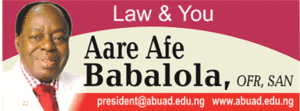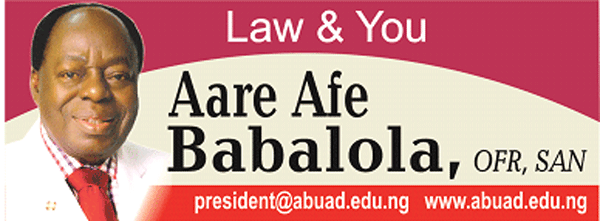

By Aare Afe Babalola
POVERTY and poor education continue to be two impeding factors to true democracy in Nigeria. Democracy as a concept of governance finds the best expression when the masses and members of the grassroots fully participate in the decision-making process, without any influence whatsoever.
According to a study, it further encompasses an ideal situation where the leadership does not arrogate to itself all wisdom in decision-making; members of the leadership do not manipulate or hoard information but rather share information so that it becomes a source of group power, a lot of debate and discussion take place before decisions are made, criticism is not only welcomed but also encouraged.
However, much remains to be seen on how true democracy will be fully expressed in the Nigerian socio-political space, particularly with the cankerworm of poverty and poor education constantly constituting a major drawback to the development of the nation’s democracy.
The impact of poverty in Nigeria’s nascent democracy: Poverty in Nigeria generally began as a controllable malignancy and, thereafter, insidiously grew to become the most ubiquitous challenge facing a vast majority of Nigerians today.
The Central Intelligence Agency’s World Factbook aptly summarised the incidence of poverty in Nigeria. Life expectancy was 52 years in 2011-2012 and 52.62years in 2014, infant mortality stood at 100 out of 1,000; 24.4 per cent of children under five years of age were stunted because of malnutrition.
Over 70 per cent still live on $1.25 per day and 35 per cent live in abject poverty, despite its abundant resources and oil wealth. Continued poverty, aggravated by mass unemployment, is a barrier to Nigeria’s quest for true democracy. Unemployment rate in Nigeria increased from 21.1 per cent in 2010 to 23.9 per cent in 2011.
The outbreak of the COVID-19 pandemic in Nigeria gave the problem of poverty an entirely new dimension, with outrageous inflation rate, increased unemployment, astronomical increase in cost of food, and crash in price of crude oil.
No doubt, politicians have continually exploited the poverty of the electorates to secure votes. A vast majority of poor Nigerians utilize election periods not as a medium of expressing their political freewill, but as an opportunity to partake in the sharing of rice, bread, and other food items. Others, through patience or violence, take receipt of the monies shared by politicians at elections.
Politicians have equally capitalised on poverty to secure the loyalty of thugs and miscreants, especially before and during elections. Unsurprisingly, in the ongoing Anambra gubernatorial elections, there were reports of ballot snatching in some polling units within the state as thugs reportedly harassed INEC officials.
The idea of similar occurrences in climes where poverty does not rage rampant is inconceivable. An author, Moyo, aptly commented on the interplay between poverty and democracy in the following words:
“People are influenced to vote by temporal gifts given by the rich and not the ideologies or programmes. Poor people’s votes are based on temporal gratification. As long as poverty persists, it will render democracy futile. But if people are removed from poverty and empowered economically, they will vote based on who has the best ideology that can better their lives and that of posterity.
Even in intraparty democracy, the rich often buy their way up to adoption levels; so we end up having people elected not because they have the ability to serve but because of being rich. They get elected over the poor who may have best ideologies.”
The Nigerian political landscape is reminiscent of a repressive society where when money speaks, all ideas wait. Aspirants to political offices do not attain political positions without answering to a political moneybag who “invests” in the aspirant’s candidacy and pulls all strings to have him secure the position in exchange for unbridled access to state funds, political influence and the practice of godfatherism.
Though this parasitic relationship more-often-than-not turns sour as both godfather and godson eventually fall out of the marriage of convenience, yet it does not seem that the unsavoury influence of poverty, particularly in securing electoral votes, will wane in a foreseeable future.
Torn in-between this quagmire are the poor masses who, unfortunately,do not consider integrity, credibility and intelligence of candidates but seek after material inducements during the electioneering campaigns and election day.
It is only unfortunate that the possibility of breaking this circle is next to nil in the upcoming 2023 general elections as the poor will continue to accept meagre inducements to hand over the mandate to the politician who will determine their socio-economic fate for the next four years.
Poor education is inimical to true
democracy: Poor education, illiteracy and ignorance hinder the effective participation of the poor in the political process. While electoral process in a democratic society should really involve the lower, middle and upper class, the poorly educated masses cannot contribute meaningfully to the decision-making process.
Though they are usually the most affected by the policies which are put in place by the governing class, their limited access to information, ability to comprehend and intellectually process the manifestoes delivered by politicians during campaigns all but contribute to the absence of true democracy.
The denial of effective decision-making power to the people is the bane of democracy in the country. Contrary to the people-centric tenet of democracy, democracy in Nigeria scarcely involves the people in decision-making, but it is the ruling elites that make far-reaching decisions and generally dictate the fate of the masses.
Worse still, the violation of the fundamental human rights of citizens and the rule of law, both which are the essentials of democracy,usually go unredressed because of poor education, illiteracy, and ignorance. While many are ignorant of their rights under the law, those who have some semblance of awareness do not seek its enforcement either due to financial incapacitation or a perceived sense of defeat.
An author once remarked that it is patently absurd for a starving peasant to be chasing after these abstract rights instead of attending to the stomach. The incidences of illiteracy and poor education are among the contributory factors to the growth of corruption in the country.
While corruption has immensely contributed to the state of poverty in the nation, political leaders who have access to, and indeed convert public funds to their private use, are never challenged by the people whose national treasury is being siphoned.
Rather, unfortunately, the people choose to celebrate political leaders whoshare part of the looted funds to achieve a more access to the public treasury. Political corruption is endemic in Nigeria, manifesting as bureaucratic and electoral malpractices, bribery, fraud, embezzlement, extortion, favoritism and nepotism in the political scene. With poverty, poor education and illiteracy in place, true democracy will continually reside in the realm of fantasy.
What must be done? To foster and sustain true democratic governance, there is a need for the holistic review of all economic policies which engender high inflation rates, unemployment, food insecurity, poor education and poverty in the country. To effectively execute this, there must be a forum for dialogue between the government and the governed.
The vices of nepotism, electoral malpractices, bribery, fraud, embezzlement, extortion, favouritism must be jettisoned for an equal opportunity amongst the citizenry.
There is need for the greater participation of those in the rural communities in agrarian reforms, improved technologies and processing facilities which will add value to raw agricultural produce.
This will create a roadmap towards alleviating poverty in the society and creating a better sensitisation of the people towards the incidences and dividends of democracy, It should also foster linkages between agricultural and non-agricultural activities by increasing effective demand in agriculture for the products of non- agricultural enterprises, especially those located in the rural areas.
Where the people are well enlightened and catered for, elections and electioneering activities will not be marred by violence, thuggery as well as rigging because then, the peoplewill value lives and property which are always their target at violent eruptions.
There should also be more focus of public spending on essential social services to increase productivity and enrich peoples’ lives. When the foregoing recommendations are effectively implemented, the country will be on course to achieving true democracy.
The post Challenges to true democracy: Poverty and poor education (2) appeared first on Vanguard News.
0 Commentaires